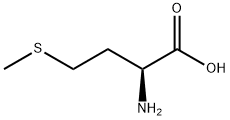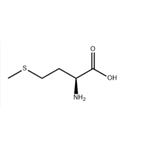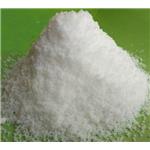Methionine (2-amino-4(methylthio)-butanoic acid) is one of the essential amino acids, which are used by our bodies to make proteins and can only be supplied by diets. Methionine is found in metal, fish, and dairy products, and it plays an important role in many cell functions.
With an asymmetric carbon, methionine molecules can be D (Dextrogyre) or L (Levogyre), optical isomers. L-methionine is the biologically active form of methionine in proteins. D-methionine is converted into L-methionine by enzymatic processes inside animal bodies in such a way that L- and D-methionine are equivalent for animal nutrition. D,L-methionine (DLM) is the most common form of commercialized methionine, composed of the racemic mixture of D and L-methionine. D,L-methionine is commercialized as a white crystalline powder, containing 99% of active substance, or in a brown liquid form with 40% purity, made from the dissolution of D,L-methionine in sodium hydroxide.
Methionine is used to prevent liver damage in acetaminophen (Tylenol) poisoning. It is also used to increase the acidity of urine, to treat liver disorders, and to improve wound healing. Furthermore, it is used for the treatment of depression, alcoholism, allergies, asthma, copper poisoning, radiation side effects, schizophrenia, drug withdrawal, and Parkinson's disease. Methionine is registered as an ingredient for use in cosmetics as antistatic and for skin conditioning (Commission Decision 2006/257/EC).
D,L-methionine is used in animal feeds for poultry and pigs, as well as in diets for cats and dogs. D,L-methionine technically pure protected with copolymer vinylpyridine/styrene, and D,L-methionine protected with ethylcellulose when used as a feed additive for ruminants, are currently authorized for use for all animal species and ruminants, respectively, by Regulation (EU) No 469/2013.









